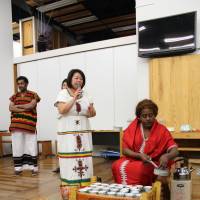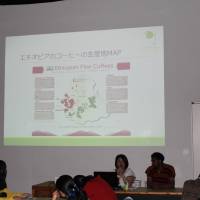Ethiopia's own coffee culture has helped people relish slow living in the nation, with a unique ceremony providing people with lively communication, a lecturer versed in the Northeast African country explained to people at a recent seminar in Tokyo.
In Ethiopia, considered to be a birthplace of the drink widely enjoyed across the globe, coffee serves as a communication tool, said Ethiopian Art Club of Japan representative Junko Yamamoto at the Minato City Eco-Plaza on March 8.
This is clearly evident given the existence of the coffee ceremony, which is widely cherished by the people of Ethiopia.
"The coffee ceremony is blended into people's everyday lives in Ethiopia," Yamamoto said. "It is not uncommon for the ceremony to last well over two hours," she added.
Performed by women, the ceremony begins with roasting green coffee beans, enabling people in attendance to appreciate the fragrant aroma, Yamamoto explained. Then the beans are ground, before they are boiled in a pot called a jebena. Before the guests are served the freshly brewed coffee, they enjoy snacks while indulging in conversation.
"With coffee, people can enjoy animated conversation ranging from daily affairs to politics, sharing the same time and space," Yamamoto noted. "I figure this is the ultimate Ethiopian way of slow living since the ceremony is conducted with a relaxed sense of time."
After Yamamoto's lecture, an official from the Ethiopian embassy in Tokyo conducted the ceremony to help the attendees better understand Ethiopian culture.
Around 20 participants in the event were able to witness the custom of the coffee ceremony firsthand, learning the process of brewing coffee. Later, they enjoyed drinking the delicious Ethiopian coffee.
The seminar was the sixth in a series introducing eco-friendly lifestyles promoted by various countries in the world. The Minato City Eco-Plaza and The Japan Times jointly organize the seminars in cooperation with embassies in Tokyo.
During the 90-minute event, Yamamoto said Ethiopia is unique in that around half of the coffee it produces is consumed within the country. Typically exports are larger than domestic consumption in many coffee-producing countries, according to her.
"Ethiopians have a culture to enjoy coffee regardless of one's income," she noted.
Ethiopia rightfully deserves to have such a custom in the first place, since the country's location in the Horn of Africa is blessed with perfect environment to grow coffee. Ethiopia meets four critical conditions, which are sufficient rain, a lot of sunshine, moderate temperature and soil suited to grow the plants, Yamamoto said.
She went on to mention other factors necessary to cultivate good coffee, which the country also fulfills. They include the existence of both wet and dry seasons — the former is necessary when the plant grows and the latter for harvesting the beans — and drastic swings in temperature between day and night.
"Ethiopia is a country apparently best suited to grow coffee beans," Yamamoto explained.
Additionally, Yamamoto told the tale of a goat herder named Kaldi in Ethiopia's Kaffa region, who is said to have discovered the coffee plant. She also noted Black Gold, a feature film released in 2008 in Japan about an Ethiopian coffee farmers' union general manager who struggles for the advancement of his workers' status and better prices for their coffee beans.
Yamamoto also explained that the Japan International Cooperation Agency has helped preserve Ethiopian forests and sell value-added coffee with the Rainforest Alliance certification in the Participatory Forest Management Project in Belete-Gera, launched in 2003, in southwest Ethiopia.




















With your current subscription plan you can comment on stories. However, before writing your first comment, please create a display name in the Profile section of your subscriber account page.